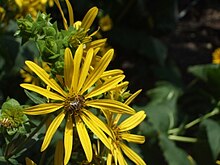Silphium (genus)
| Silphium | |
|---|---|

| |
| Silphium integrifolium | |
| Scientific classification | |
| Kingdom: | Plantae |
| Clade: | Tracheophytes |
| Clade: | Angiosperms |
| Clade: | Eudicots |
| Clade: | Asterids |
| Order: | Asterales |
| Family: | Asteraceae |
| Subfamily: | Asteroideae |
| Tribe: | Heliantheae |
| Subtribe: | Engelmanniinae |
| Genus: | Silphium L. |
| Type species | |
| Silphium asteriscus | |
Silphium is a genus of North American plants in the tribe Heliantheae within the family Asteraceae.[1][2]
Members of the genus, commonly known as rosinweeds, are herbaceous perennial plants growing to 0.2 m (8 in) to more than 2.5 m (8 ft 2 in) tall, with yellow (rarely white) flowerheads that resemble sunflowers. In the rosinweeds, the ray florets in the head are female and the disc florets are male;[3] this differs from sunflowers, where ray florets are sterile and disc florets are perfect, capable of producing both pollen and seeds.[4]
The name of the genus comes from the Ancient Greek word for a North African plant whose identity has been lost, though it is known its gum or juice was prized by the ancients as a medicine and a condiment.[3]
Species
Species in the genus include:[5][3][6][7][8][9]
- Silphium albiflorum A.Gray – white rosinweed – TX
- Silphium asteriscus L. – starry rosinweed – TX OK LA AR MO IL IN KY TN AL MS GA FL SC NC VA WV OH MD PA NY
- Silphium brachiatum Gatt. – Cumberland rosinweed – TN AL GA
- Silphium compositum Michx. – kidneyleaf rosinweed – TN AL GA FL SC NC VA WV
- Silphium glutinosum J.R. Allison AL
- Silphium integrifolium Michx. – wholeleaf rosinweed – NM TX LA OK AR MO KS CO WY SD NE IA IL IN KY TN MS AL WI MI MA ONT
- Silphium laciniatum L. – compassplant – NM TX LA OK AR MO KS CO SD NE MN IA IL IN KY TN MS AL WI MI VA PA NY ONT
- Silphium laeve Hook.
- Silphium mohrii Small – Mohr's rosinweed – TN AL GA
- Silphium perfoliatum L. – cup plant – NM TX LA OK AR MO KS CO SD ND NE MN IA IL INKY TN MS AL WI MI NC VA DE PA NY NJ CT RI MA VT NH ME ONT QUE NB
- Silphium perplexum J.R.Allison – Old Cahaba rosinweed – AL
- Silphium pinnatifidum Elliott – Cutleaf prairie dock – AL GA KY TN
- Silphium radula Nutt. – roughstem rosinweed – KS MO AR OK TX LA
- Silphium terebinthinaceum Jacq. – prairie rosinweed, prairie dock – IA MO AR MS AL GA SC NC VA WV TN KY OH IN IL WI MI NY ONT
- Silphium ternatum Sessé & Moc. – Mexico
- Silphium trifoliatum L. – whorled rosinweed – AL GA IN KY MD NC SC OH PA VA WV
- Silphium wasiotense M.Medley – Appalachian rosinweed – KY TN
- Silphium integrifolium (rosinweed) flowers
- Silphium laciniatum (compass plant) leaves
- Silphium terebinthinaceum (prairie dock) leaves
Formerly included
Numerous species are now regarded as members of the genera Berlandiera and Verbesina.[5]
See also
- Genus Calycadenia – the western rosinweeds
References
- ^ Linnaeus, Carl (1753). Species Plantarum (in Latin). Vol. 2. pp. 919–920.
- ^ "Silphium L.". Tropicos. Missouri Botanical Garden.
- ^ a b c Clevinger, Jennifer A. "Silphium". In Flora of North America Editorial Committee (ed.). Flora of North America North of Mexico (FNA). New York and Oxford: Oxford University Press. Retrieved 2008-06-24 – via eFloras.org, Missouri Botanical Garden, St. Louis, MO & Harvard University Herbaria, Cambridge, MA.
- ^ Schilling, Edward E. (2006). "Helianthus". In Flora of North America Editorial Committee (ed.). Flora of North America North of Mexico (FNA). Vol. 21. New York and Oxford: Oxford University Press – via eFloras.org, Missouri Botanical Garden, St. Louis, MO & Harvard University Herbaria, Cambridge, MA.
- ^ a b Flann, C (ed) 2009+ Global Compositae Checklist Archived 2014-11-06 at archive.today
- ^ International Organization for Plant Information (IOPI). "Plant Name Search". International Plant Names Index. Retrieved 2008-06-24.
- ^ NRCS. "Silphium". PLANTS Database. United States Department of Agriculture (USDA). Retrieved 2008-06-24.
- ^ "Silphium". Germplasm Resources Information Network. Agricultural Research Service, United States Department of Agriculture. Retrieved 2011-02-16.
- ^ "Silphium". County-level distribution maps from the North American Plant Atlas (NAPA). Biota of North America Program (BONAP). 2014.
External links
- NRCS. "Silphium". PLANTS Database. United States Department of Agriculture (USDA).




